Maxmilian Wechsler meets Moscow-educated linguist ‘Joy’ who’s busy helping Russian visitors to communicate in Pattaya and Phuket
| THE Russians are coming to Thailand in huge numbers, but few can speak Thai or English so the need for translators and interpreters in their own language has never been greater. Helping to fill the void is Miss Weenarat Worawong, a Thai lady with a PhD in Russian language from a university in Moscow where she lived for many years. Known as Joy, a nickname that suits her buoyant personality, she gives assistance to Thai authorities in their dealings with Russians in the Kingdom. She also helps Russian expats and tourists who need assistance negotiating the Thai legal and bureaucratic systems. |
Every Russian who talked to The BigChilli said her Russian is flawless. “If you don’t see her and talk on the phone, you will assume she is a native Russian speaker, not a Thai-born woman,” said one man. “I know several Russian interpreters in Pattaya, but none of them can compare to Joy,” said another.
Some Russians have even asked her what part of their country she comes from. She can also read and write the language perfectly as well.
According to Department of Tourism figures, Russians make up the third largest group of visitors to Thailand – about 1.6 million last year. There are also thousands of Russians who reside here permanently or for part of the year. Russians favor the beach resorts of Pattaya and Phuket, and many stay in Bangkok at any one time. It should be noted that tourists from several other countries also speak Russian.
Police, prosecutors, lawyers and even hospital staff are in desperate need of interpreters who can communicate with the Russians here, as many of them speak little or no English. Joy deals mostly with Russian speakers who have been involved in road accidents or victimized by criminals. She is also sometimes called upon to help in cases involving individuals wanted by law enforcement agencies in Thailand or the Russian Federation. But her most important role may be as a teacher of the Russian language in Thailand.
Background
Born in Ratchaburi in 1978, Joy received her primary education in Nakhom Pathom province. In 1996, when she was 18 years old, she made the bold move of going to Russia to further her education. “In fact, I followed the steps of my father, elder brother and younger sister, who also studied in Moscow” said Joy in English with a strong Russian accent. “It is like our family tradition. I didn’t choose Russia. It was the decision of my parents.”
Her family contacts helped her obtain a scholarship from the Russian Federation, and Joy spent 14 years in Moscow, most of that time studying. “My first language was Russian; English was second,” said Joy, who earned her bachelor’s and master’s degrees at Moscow State University, Faculty of Foreign Languages and then completed a doctorate in Russian and methods of teaching at People’s Friendship University of Russia.
Some Russians have even asked her what part of their country she comes from. She can also read and write the language perfectly as well.
According to Department of Tourism figures, Russians make up the third largest group of visitors to Thailand – about 1.6 million last year. There are also thousands of Russians who reside here permanently or for part of the year. Russians favor the beach resorts of Pattaya and Phuket, and many stay in Bangkok at any one time. It should be noted that tourists from several other countries also speak Russian.
Police, prosecutors, lawyers and even hospital staff are in desperate need of interpreters who can communicate with the Russians here, as many of them speak little or no English. Joy deals mostly with Russian speakers who have been involved in road accidents or victimized by criminals. She is also sometimes called upon to help in cases involving individuals wanted by law enforcement agencies in Thailand or the Russian Federation. But her most important role may be as a teacher of the Russian language in Thailand.
Background
Born in Ratchaburi in 1978, Joy received her primary education in Nakhom Pathom province. In 1996, when she was 18 years old, she made the bold move of going to Russia to further her education. “In fact, I followed the steps of my father, elder brother and younger sister, who also studied in Moscow” said Joy in English with a strong Russian accent. “It is like our family tradition. I didn’t choose Russia. It was the decision of my parents.”
Her family contacts helped her obtain a scholarship from the Russian Federation, and Joy spent 14 years in Moscow, most of that time studying. “My first language was Russian; English was second,” said Joy, who earned her bachelor’s and master’s degrees at Moscow State University, Faculty of Foreign Languages and then completed a doctorate in Russian and methods of teaching at People’s Friendship University of Russia.
“Before I went to Russia I heard that the weather is always bad, it is dark and always snowing and the people are not nice and polite. But when I arrived I found that, yes, it was definitely cold and sometimes tough to live in Moscow, but the Russian people were so nice and helpful. I mean the ‘real Russian’ people,’” she stressed.
Four years before going back to Thailand she went to work for Thai Airways International in Moscow. “First I helped them with translation. I translated for the director of the Stockholm office, who often came to Moscow for different appointments. I helped with communication when a new route was opened between Moscow and Bangkok. I also helped at exhibitions as a presenter. I looked quite cute at that time and they wanted me to be their face in a Thai costume. But mainly they wanted me because I could speak Russian. The flight attendants can speak only English and Thai.”
In 14 years Joy made nine trips back to Thailand. “I felt lonely at first, but later I got used to everything, so I didn’t get homesick anymore. The last three or four times I came home it was because I had important things to do here. As for my Thai language, it wasn’t a problem; I didn’t forget it. After I joined Thai Airways I could talk to flight staff. The captains would bring me Thai food and books.”
Back in Thailand
After she returned to Thailand in 2011, Joy decided she’d rather not live in Ratchaburi and stayed in Bangkok. She began looking for a situation where she could use her knowledge of the Russian language. “I knew I would work in Bangkok, Pattaya or Phuket. I spent my first year back in Thailand choosing where I wanted to live. I finally decided on Pattaya because it is not far from Bangkok, so it allows me to work in both places. Pattaya is cozy and I feel sort of like I’m in Moscow because there are a lot of Russian people here.
“I became involved with the police in Pattaya for the first time in 2011 when a friend who is a lawyer asked me to help with translation. She was assisting Russian tour agencies that had problems with the Tourist Police. My friend couldn’t speak any Russian, and I was happy to do it as it was my aim to be an interpreter for the Royal Thai Police (RTP). I was willing to do whatever it took to prepare myself for such a position, and I understood that I needed to learn as much as possible about the police system. After three years I think I am ready for any case.
“Anyway, we were able to help the Russian tourists, and afterward the police chief asked for my phone number. Sometime later he called me and said: ‘Please help us with the Russian language. A tourist company has gone bankrupt and the Russian tourists are now in trouble.’ This was my first real case.
“When the news spread about my work for the police, people were calling me all the time, sometimes very early in the morning. The police called me often and I was happy to help. Calls were coming from tourists as well. At that time I was so ‘new’ in Thailand that I didn’t know where different places were. One Russian tourist who called to ask for help said he was in Rawai Beach. I didn’t even know that Rawai is in Phuket, I thought it was in Pattaya,” said Joy, laughing.
She also helps tourists and expats from other republics where Russian is spoken, such as Kazakhstan, Uzbekistan and Ukraine. “Most Thai people, including the police, assume that anyone who speaks Russian is a Russian. But some people will get really upset if they are called Russians, especially Ukrainians. I know this very well from some cases I have taken. The Thai authorities should also be aware of this and act accordingly,” said Joy.
Four years before going back to Thailand she went to work for Thai Airways International in Moscow. “First I helped them with translation. I translated for the director of the Stockholm office, who often came to Moscow for different appointments. I helped with communication when a new route was opened between Moscow and Bangkok. I also helped at exhibitions as a presenter. I looked quite cute at that time and they wanted me to be their face in a Thai costume. But mainly they wanted me because I could speak Russian. The flight attendants can speak only English and Thai.”
In 14 years Joy made nine trips back to Thailand. “I felt lonely at first, but later I got used to everything, so I didn’t get homesick anymore. The last three or four times I came home it was because I had important things to do here. As for my Thai language, it wasn’t a problem; I didn’t forget it. After I joined Thai Airways I could talk to flight staff. The captains would bring me Thai food and books.”
Back in Thailand
After she returned to Thailand in 2011, Joy decided she’d rather not live in Ratchaburi and stayed in Bangkok. She began looking for a situation where she could use her knowledge of the Russian language. “I knew I would work in Bangkok, Pattaya or Phuket. I spent my first year back in Thailand choosing where I wanted to live. I finally decided on Pattaya because it is not far from Bangkok, so it allows me to work in both places. Pattaya is cozy and I feel sort of like I’m in Moscow because there are a lot of Russian people here.
“I became involved with the police in Pattaya for the first time in 2011 when a friend who is a lawyer asked me to help with translation. She was assisting Russian tour agencies that had problems with the Tourist Police. My friend couldn’t speak any Russian, and I was happy to do it as it was my aim to be an interpreter for the Royal Thai Police (RTP). I was willing to do whatever it took to prepare myself for such a position, and I understood that I needed to learn as much as possible about the police system. After three years I think I am ready for any case.
“Anyway, we were able to help the Russian tourists, and afterward the police chief asked for my phone number. Sometime later he called me and said: ‘Please help us with the Russian language. A tourist company has gone bankrupt and the Russian tourists are now in trouble.’ This was my first real case.
“When the news spread about my work for the police, people were calling me all the time, sometimes very early in the morning. The police called me often and I was happy to help. Calls were coming from tourists as well. At that time I was so ‘new’ in Thailand that I didn’t know where different places were. One Russian tourist who called to ask for help said he was in Rawai Beach. I didn’t even know that Rawai is in Phuket, I thought it was in Pattaya,” said Joy, laughing.
She also helps tourists and expats from other republics where Russian is spoken, such as Kazakhstan, Uzbekistan and Ukraine. “Most Thai people, including the police, assume that anyone who speaks Russian is a Russian. But some people will get really upset if they are called Russians, especially Ukrainians. I know this very well from some cases I have taken. The Thai authorities should also be aware of this and act accordingly,” said Joy.
| Criminal cases “I have helped the police in many types of cases, from road and boating accidents to rape, robbery and murder. I helped the Economic Crime Suppression Division police in Bangkok after they arrested Russians and Ukrainians involved in credit card fraud. I also assisted the police in Nakhon Ratchasima in a court case involving two Russian ATM skimmers,” Joy said. The suspects, Vasily Ivanoff and Sergei Peterneff, were arrested in November 2013 with over 300 counterfeit ATM and credit cards and about 2.9 million baht in cash. A Thai accomplice, Pol Sgt Maj Nonthapan Saengsuk, was also arrested. A search of the two Russians’ hotel rooms in Bangkok turned up more cash and credit cards. Police said the gang used ‘skimmer’ devices to hack information from the victims’ credit cards and then made counterfeit cards to withdraw cash from ATMs. Joy also translated during a press conference in Bangkok presided over by Police General Wuthi Liptapallop, Deputy Director-General of the RTP, called after the arrest of Russian national Alexander Matusov, who was wanted by the Russian police. Mr Matusov, allegedly a Russian mafia leader, was arrested in Sattahip, Chonburi province, in June 2014. His gang was involved in extortion, kidnapping and scores of killings around Moscow and St Petersburg from 1995 to 2009. “The most interesting case involved a kidnapping and murder last year in Phuket. I spent 14 days there helping the police,” Joy said. |
Two Russians, Alexei Slabinskiy and his girlfriend Yana Strizheus, were kidnapped in early March 2014. Police dogs found the man’s decapitated and badly decomposed body in the woods. Ms Strizheus was discovered alive and alone inside a room at the Blue Garden Resort and Spa. She reportedly had self-inflicted wounds on her body following a suicide attempt made in desperation.
The perpetrators were a Russian and Ukrainian man, and likely a third person. Police suspect that they escaped by boat. Investigators now say that the couple had borrowed three million baht from Alexander Novichkov, one of the kidnappers, and failed to pay him back. According to one source, Ms Strizheus did not tell the whole truth to investigators before returning to Russia in April.
Joy often assists police at Banglamung station in Naklua near Pattaya, but also answers calls for help from all over Thailand. “I help the police when Russians are the victims or perpetrators of crimes. I don’t really know exactly how many cases I have been involved in, but it must be well over 100. I have had to slow down some because I was getting exhausted.
“I am happy to help as long as I enjoy what I am doing, but helping the police is not my job I am not paid for it. I have also been helping prosecutors in Pattaya and Chonburi, again with no pay.
“I have a steady income as a translator and interpreter. Together with a Russian man I have a company doing business in Bangkok, Pattaya and Phuket,” said Joy. “When someone needs my services, for example a Russian businessman who needs me to translate in court, he pays me an hourly fee and afterward buys my lunch. Many of our clients are Russians who were cheated by either Thais or other Russians. Disputes often arise in the property sector, which many Russian businessmen here are involved in.
Russians in Thailand
“I have many Russian friends here, including some of the people I have helped. There are all types of Russian tourists coming here,” said Joy. “Many stay in Pattaya during the Russian winter. A lot of them can communicate only in their native language. I think they more or less trust me because they don’t have any other choice.” She adamantly denied that there is a Russian mafia in Pattaya or anywhere else in Thailand, as is often claimed in the media.
“There’s a difference between Russians in Pattaya and in Phuket. Pattaya is more of a party town; they drink whisky and vodka and they get drunk. But in Phuket it is mainly families. Russians visiting Phuket aren’t going there for sex or to drink in the bars. They just come with their families and there are not so many problems involving Russians like there are in Pattaya.
“The most common crime committed against Russians in Pattaya is probably robbery, and sometimes they are drugged first. Russians like walking, even at night, and that’s when they are vulnerable to Thai teenagers riding motorcycles who are looking to snatch a bag or something. There are many Russians involved in road accidents in Pattaya. This happens almost every day. Sometimes I receive requests from the hospital to translate when a Russian is injured.
“In general the police appreciate my help, especially the high-ranking officers, but some in the lower ranks don’t seem to. I guess that’s because I hold a PhD and work for free. Maybe this isn’t normal to them,” said Joy with a slight frown.
The perpetrators were a Russian and Ukrainian man, and likely a third person. Police suspect that they escaped by boat. Investigators now say that the couple had borrowed three million baht from Alexander Novichkov, one of the kidnappers, and failed to pay him back. According to one source, Ms Strizheus did not tell the whole truth to investigators before returning to Russia in April.
Joy often assists police at Banglamung station in Naklua near Pattaya, but also answers calls for help from all over Thailand. “I help the police when Russians are the victims or perpetrators of crimes. I don’t really know exactly how many cases I have been involved in, but it must be well over 100. I have had to slow down some because I was getting exhausted.
“I am happy to help as long as I enjoy what I am doing, but helping the police is not my job I am not paid for it. I have also been helping prosecutors in Pattaya and Chonburi, again with no pay.
“I have a steady income as a translator and interpreter. Together with a Russian man I have a company doing business in Bangkok, Pattaya and Phuket,” said Joy. “When someone needs my services, for example a Russian businessman who needs me to translate in court, he pays me an hourly fee and afterward buys my lunch. Many of our clients are Russians who were cheated by either Thais or other Russians. Disputes often arise in the property sector, which many Russian businessmen here are involved in.
Russians in Thailand
“I have many Russian friends here, including some of the people I have helped. There are all types of Russian tourists coming here,” said Joy. “Many stay in Pattaya during the Russian winter. A lot of them can communicate only in their native language. I think they more or less trust me because they don’t have any other choice.” She adamantly denied that there is a Russian mafia in Pattaya or anywhere else in Thailand, as is often claimed in the media.
“There’s a difference between Russians in Pattaya and in Phuket. Pattaya is more of a party town; they drink whisky and vodka and they get drunk. But in Phuket it is mainly families. Russians visiting Phuket aren’t going there for sex or to drink in the bars. They just come with their families and there are not so many problems involving Russians like there are in Pattaya.
“The most common crime committed against Russians in Pattaya is probably robbery, and sometimes they are drugged first. Russians like walking, even at night, and that’s when they are vulnerable to Thai teenagers riding motorcycles who are looking to snatch a bag or something. There are many Russians involved in road accidents in Pattaya. This happens almost every day. Sometimes I receive requests from the hospital to translate when a Russian is injured.
“In general the police appreciate my help, especially the high-ranking officers, but some in the lower ranks don’t seem to. I guess that’s because I hold a PhD and work for free. Maybe this isn’t normal to them,” said Joy with a slight frown.
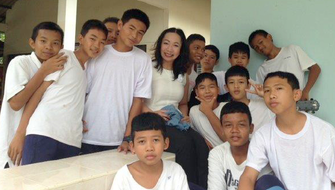 Teaching temple boys
Teaching temple boys Focusing on the future
“When I first started helping the police it was very interesting for me, but later it started to wear me down. There are so many Russians here and of course some percentage of them will have problems. I can’t possibly help all of them. Therefore I began to think it was time to focus more on teaching and passing on my knowledge of the Russian language to others. So I am now teaching school children and police officers to speak Russian.
“I started with young officers just out of police school. I chose two girls and one guy who were attached to the Pattaya police station. The class was at midnight because it was a relatively slow time for them. I am very happy with the result because all three can now speak some Russian and help Russians in Pattaya. They are so clever. Of course, it is not enough, but it helps.
“Once I met the governor of Chonburi province, Khun Komsan Ekachai, and he told me: ‘You are only one person in a country with millions of Russian tourists. Therefore, you have to teach Russian to children.’ That’s why I met with Pattaya Mayor Khun Itthiphol Kunplome. I told him that I would like to teach children anywhere in Pattaya. He chose Pattaya city school No. 11. I have been teaching Russian to 30-40 students there since 2012. I am happy with the results.
“I am also teaching at the Banglamung police station. I wanted someone to help me with translation, and I thought that the policemen were a bit too old to learn, so I decided to teach their children. They can help their fathers, or in some cases their grandfathers. I teach there an hour every Wednesday and Thursday. These kids are also very clever, and I enjoy teaching them.” Last year Joy taught some 20 staff at U-Tapao airport because many charter flights arrive there are from Russian-speaking nations.
“I have been helping the police and other authorities for three years now because I know there is a great need for my language skills with so many Russians coming to Thailand. Even though I work for free and sometimes it is exhausting, I am still happy to do it.
“I am grateful to the government of the Russian Federation for granting me a scholarship, and I want to repay them by helping Russian citizens in Thailand. It is my way of saying ‘thank you.’ I love Russia,” Joy declared.

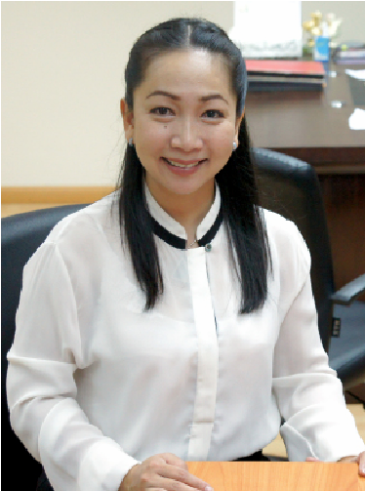
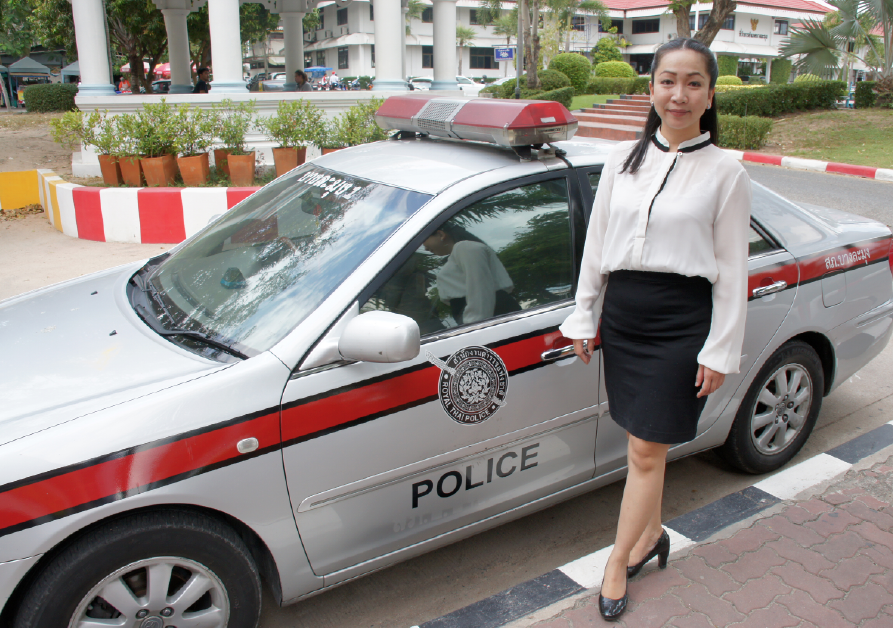
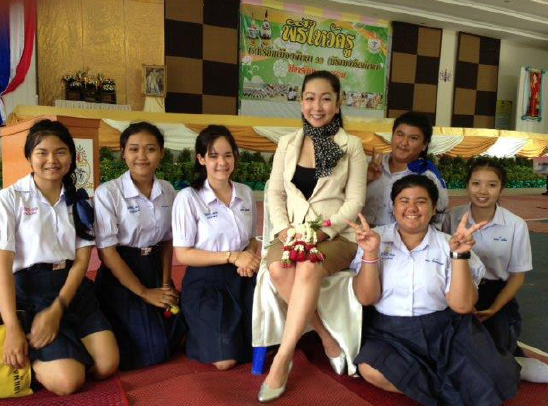
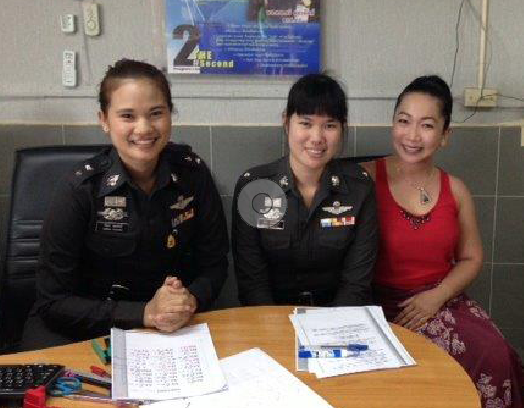
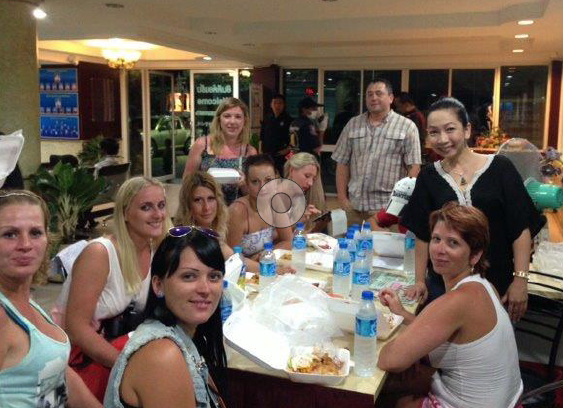
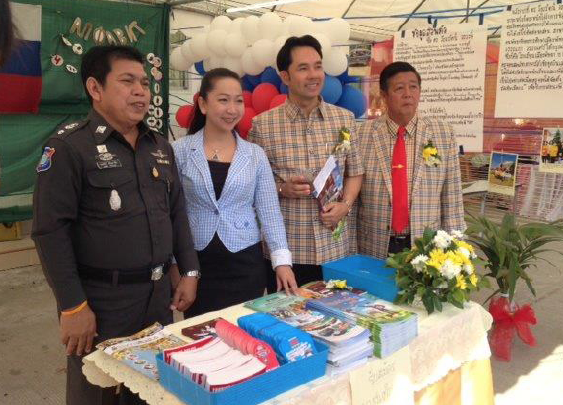
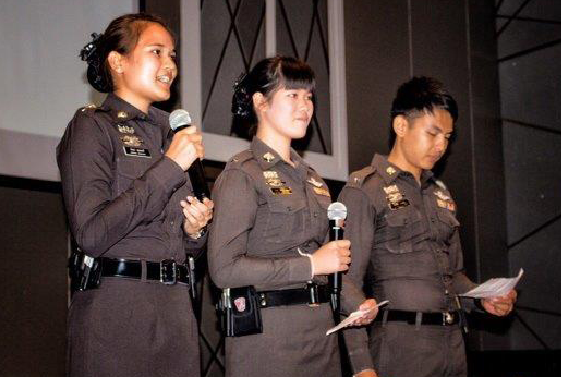
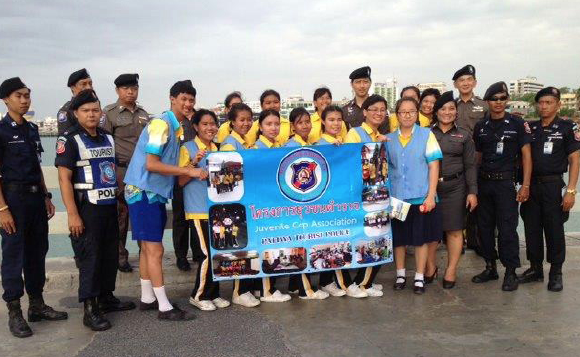
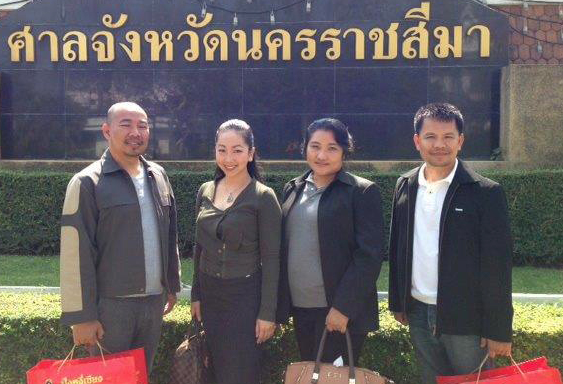
 RSS Feed
RSS Feed
















